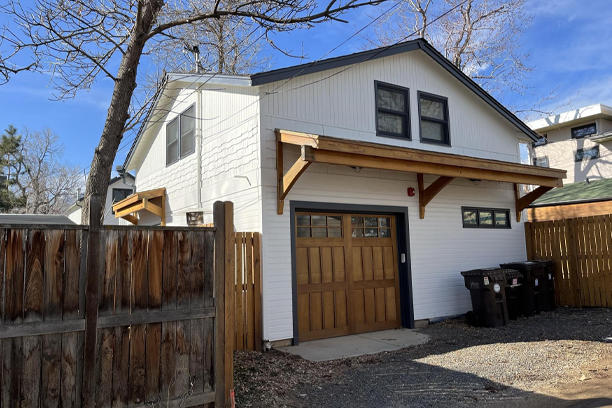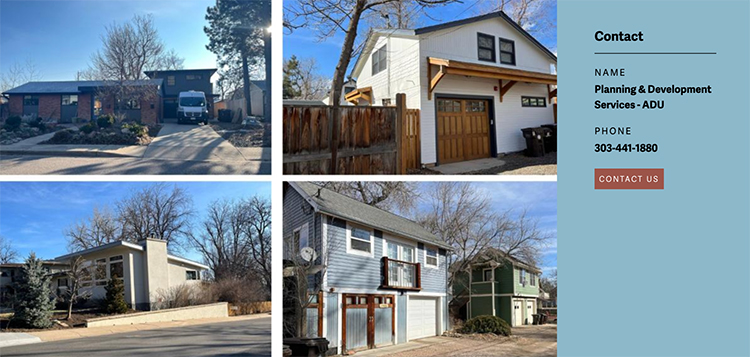City of Boulder
Background
 The City of Boulder is located at the foothills of the Rocky Mountains and is known for its access to outdoor recreation and a mix of academic, residential, and commercial activities. Boulder has faced significant housing challenges in recent years, including high costs and limited supply. Despite allowing ADUs since 1983, the City has historically imposed strict zoning laws on ADU construction, owner occupancy requirements, and saturation limits. Over time, the City has enacted many incremental changes to their ADU program. In 2019, the City expanded ADU permission to all low-density residential zone districts, implemented incentives for affordable ADUs (those affordable to households at 75% of AMI or below), increased the allowable saturation and size levels, and loosened parking requirements. These changes doubled the number of ADUs from 200 to 441 units between 2019 and 2022.
The City of Boulder is located at the foothills of the Rocky Mountains and is known for its access to outdoor recreation and a mix of academic, residential, and commercial activities. Boulder has faced significant housing challenges in recent years, including high costs and limited supply. Despite allowing ADUs since 1983, the City has historically imposed strict zoning laws on ADU construction, owner occupancy requirements, and saturation limits. Over time, the City has enacted many incremental changes to their ADU program. In 2019, the City expanded ADU permission to all low-density residential zone districts, implemented incentives for affordable ADUs (those affordable to households at 75% of AMI or below), increased the allowable saturation and size levels, and loosened parking requirements. These changes doubled the number of ADUs from 200 to 441 units between 2019 and 2022.

Image Source: City of Boulder
Program Design and Considerations
Amending ADU Codes to Increase Development
- ADU Allowance: In 2019, the City expanded ADU allowances to all low-density residential zone districts and increased the saturation limit (the number of ADUs allowed in a neighborhood). The limit was removed entirely in 2023.
- Design and Dimensional Standards: The maximum size allowed for ADUs—excluding those on designated historic properties or part of the Affordable ADUs program (see below)—has been increased beyond the minimum established in state law:
- Detached ADUs can be up to 800 square feet.
- Attached ADUs can be up to 50% the floor area of the principal structure or 1,000 square feet (whichever is less). If the principal structure is less than 1,500 square feet, the maximum is 750 square feet.
- Parking and Owner Occupancy: The City has removed off-street parking and owner occupancy requirements for all ADUs.
Streamlining ADU Review and Approval
- Auditing Application Review Process: The City conducted internal interviews with customer service staff to better understand what questions were coming up in their engagement with homeowners considering developing ADUs.
- Requiring Only a Building Permit: As of 2023, ADUs are no longer subject to an initial administrative review and are instead eligible to apply directly for a building permit. This change was made by the City to reduce barriers to ADU development and simplify the review process.
Incentivizing Affordable ADU Rentals
Since 2019, the City’s ADU program has provided regulatory incentives for homeowners who designate their ADU as an affordable unit. Affordable ADUs must be affordable to households earning 75% of the Area Median Income (each year the city provides a table of affordable ADU maximum rents). In exchange for recording a Declaration of Use with the Boulder County Clerk and Recorder and complying with all requirements related to affordable ADUs, the City allows both attached and detached ADUs to be of a larger size.
The increased size requirements are 1,000 square feet for a detached ADU or up to 1,200 square feet or 2/3 the size of the principal home, whichever is less, for an attached ADU. About a third of homeowners developing ADUs choose the affordable ADU option. Through surveys, City staff have found that market rate ADUs are also staying below the affordability limit.
Homeowner Technical Assistance
On their website, the City provides an Accessory Dwelling Unit (ADU) Guide to support homeowners as they design their ADU and navigate the application process. City staff also made an effort to procure photos of existing ADUs, helping people who might be skeptical see that ADUs can be attractive and fit in well with neighborhoods.

Takeaways
The City has intentionally opted for an incremental approach. What was initially a highly controversial program has become much less so with time, and changes to code in 2023, and later in 2025, to align with state law requirements, were not politically challenging. The addition of the affordable ADU program in 2019 was viewed as more palatable because of its emphasis on affordability.
In designing their program, they focused on the process, not just the regulatory changes. Prioritizing user friendliness and developing materials that are helpful to homeowners navigating the ADU development process were guiding principles. City staff highlighted the importance of internal collaboration with the planning, development, and housing and human services departments for program success. While City staff do not anticipate any changes to local ADU regulation in the near future, some council members and appointed board members are interested in allowing ADUs for more than just single-family homes and allowing more than one ADU on a lot (see Additional Opportunities to Amend ADU Codes and Increase Development strategy profile). Additionally, some board and council members are interested in splitting lots so that ADUs can be owned instead of rented (see Enabling a Pathway for the Separate Sale of an ADU strategy profile).
Resources
- City of Boulder ADU Webpage includes an overview, ADU benefits, and FAQ
- ADU Guide provides step by step guidance
- ADU Ordinance effective March 8, 2025
Accessory Dwelling Unit (ADU) Toolkit
We're Here to Help!
Do you have questions about the new laws and impacts to your jurisdiction? Check out our FAQ page, visit our main State Land Use and Housing Legislation page to learn about all the laws, or get one-on-one support below: